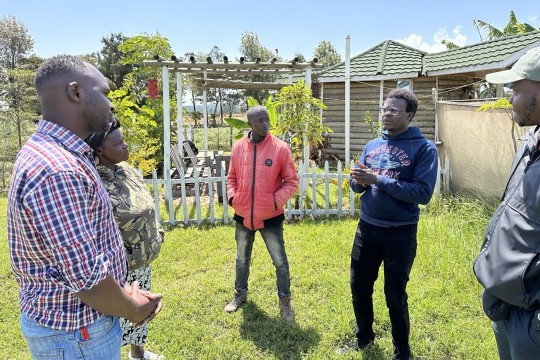Two graduate students earn NSF fellowships
Fellowship supports outstanding graduate students conducting research in science and engineering
The National Science Foundation Graduate Research Fellowship Program has rewarded the exceptional efforts of two Rochester Institute of Technology students.
The NSF program provides awards to outstanding graduate students pursuing research in science and engineering. The NSF Graduate Research Fellowship will provide three-year, $34,000 annual stipends to Larwan Berke and Brendan John, graduate students in RIT’s B. Thomas Golisano College of Computing & Information Sciences.
Berke, a doctoral computing and information sciences student from Fremont, Calif., won support for his project, “Displaying Confidence from Imperfect Automatic Speech Recognition for Captioning.” His research focuses on creating a system to identify potential errors in automatically produced captions and making captions more useful for people who are deaf and hard-of-hearing (DHH).
“It’s a big honor, and I’m elated to know that the computing researchers who evaluated my application saw potential of this research,” said Berke. “I am also looking forward to mentoring DHH students who are interested in assistive technologies. A major part of my project will be to get more DHH students interested in this field by giving them opportunities to become involved in the scientific process, as part of my NSF-supported research. Finally, this fellowship frees up funding for my adviser, Dr. Matt Huenerfauth, so he can hire even more DHH students to join our research team at the Center for Accessibility and Inclusion Research.”
John, a graduate student from Salamanca, N.Y., won support for his project, “Visual Attention in Virtual Collaborative Environments.” The project concentrated on developing a system that allows people to collaborate in a common virtual reality space to study crime scenes, diagnose medical conditions and more.
“The fellowship is prestigious and provides a sense of accomplishment, as well as motivation to follow through with my Ph.D. and succeed,” said John. “It makes all of the hard work I’ve done the last few years worth it and inspires me to push the limits of what I can accomplish during graduate school.” John is expected to graduate this spring with a bachelor’s degree in computational mathematics and a Master of Science in computer science, and he plans to pursue a doctoral degree in computer science at the University of Florida. He said ultimately he hopes to motivate “more Native American students to pursue graduate school in STEM once I obtain my Ph.D. and start teaching. While the numbers of underrepresented populations in graduate school is rising, the numbers for Native students pursuing computer science doctoral degrees is drastically low.”
“I am extremely proud of Larwan and Brendan, as is all of RIT,” said Twyla Cummings, dean of graduate education at RIT. “They exemplify the high caliber of the master’s and doctoral students enrolled at RIT. They are highly intelligent, thoughtful and dedicated to research and learning. They represent us well.”














